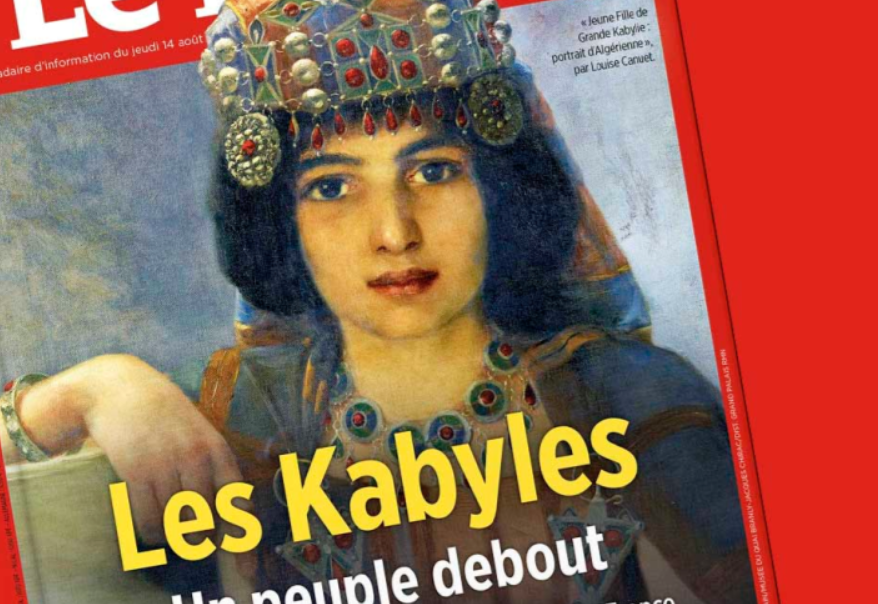Physical Address
Indirizzo: Via Mario Greco 60, Buttigliera Alta, 10090, Torino, Italy
Physical Address
Indirizzo: Via Mario Greco 60, Buttigliera Alta, 10090, Torino, Italy


In its issue dated Thursday, August 14, 2025, the weekly the point devotes a file to the Algerians of Kabyle expression, entitled ” The Kabyles – a standing people ”. The opportunity for us to demystify this Berberist and neocolonial ideological concept of a category of the Algerian population designated by ” Kabyle people ”.
First, what is the Kabyle the name? Kabyle is a common word, more precisely an adjective, used to qualify … It is not at all a proper name used to designate a population, a resident, who has never had a national existence.
Historically, the Kabyle term derives from Arabic “qabail” which means “tribe”. However, when we speak of tribe we hear a human group (agglomeration of families) based on a real or supposed ethnic kinship, in pre -industrial societies. And not a people, nation or nation state, of the concepts foreign to the ancient tribal populations.
Each region of the Maghreb and, consequently of Algeria, being made up of several “five-gender” tribes or poplades (including, to take a more recent example, in particular the great Sanhadja Zouaouas, Zénète, Masmouda, Kutama, Awarba, Berghouata, Houaras), each tribe was decomposed in subtribus. All these sub-tribes had territorial and decision-making independence. Each tribe almost constituted an autarkic “nation”, viscerally attached to its autonomy, in love with independence.
Later, in the 19th century, after the conquest of Algeria by France, the term “Kabyle” was created by French colonists (notably military sociologists: Colonel Daumas, Captain Fabre (1847), Captain Ernest Carette (1848), Henri Aucapitaine, better known as “Baron Aucapitaine” (1857), Admiral Louis-Henri de Gueydon, And General Edmond Pelissier de Reynaud who professed the merger between Europeans and “Kabyle Barbarians”), to designate the tribal populations of the mountainous regions of Algeria. Originally, the term “Kabyle”, in the sense of tribe, designated the inhabitants of the Aurès as much as the Algerians of the mountain ranges of the West.
Then, curiously, this word ended up exclusively applied to the Berber -speaking inhabitants of the Kabyle region.
This differentiation marks the start of Kabyle policy. Indeed, the Kabylia region will now be the issue of a sneaky “positive discrimination” policy applied by the French colonial authorities to detach it from other Arabic -speaking regions.
With an unspeakable aim of division of Algerians, the “Kabyle myth” (the ancestor of Berberism but today maneuvered by certain pharmacies of foreign countries), initiated by colonial France, consisted in presenting the inhabitants of Kabyle expression as a radically distinct population of other “Arabic -speaking” inhabitants of Algeria. And it is not for nothing that the colonist Nicolas Bibesco had written “France studied there closely the pure Kabyle race, she studied it at its source; She discovered the real way of taking it and governing it. ”
By his supposed physical features related to Europeans, by its ethnic ancestors allegedly allegedly “Aryan”, by its Christian “religious roots” exhibited for the colonial cause, by the alleged superiority of its intelligence, by the
Modernity of its mentality, by its so-called flexible and tolerant practice of Islam, by its alleged secular spirit viscerally innate, by its congenitically democratic political traditions, etc., the Algerian population of Kabyle expression was haloed by all the bourgeois virtues conducive to its wealthy assimilation with French colonial and imperialist culture.
In other words, the objective of “Kabyle politics” was to manufacture the mythology of a “civilized Kabyle”, different from Arabic tried barbaric; A Kabyle “citizen” respectful of republican and secular values, different from Arabic considered feudal, slavery, fanatic, ignorant, inassimable to civilization (Western erected in universal model).
In his time, Sabatier, lawyer and politician of the colonial era, had written: “Let it be well known, by them the future reserves for France a great role in Africa, as well as by France it reserves a great role for Kabyles in humanity. »»
This powerful colonial propaganda, propagated on a large scale, unfortunately continues to provoke neocolonial political ravages, especially among contemporary communitarian and independence Berberists who cultivate a particularism and separatism based on stereotypes straight derived from racial theories spread by the improvised French colonists, which ethnologists, who anthropologists Historians, to promote the existence of the “Kabyle race”, mythology today transformed into Kabyle people by the Berberists.
Be that as it may, it is important to recall that at the ancient era glorified by our self -proclaimed Berberist historian contemporaries, there was neither Kabyle state, nor of Kabyle nation, nor of Kabyle people. Nor of Kabyle nation state. Notions emerging in the 18th century in Europe thanks to the development of capitalism.
At that time, so much magnified by the Berberists in search of mythical identity construction, there were only aggregates of Berber -speaking peoples speaking of varied and variable idioms from one region to another, tribes confederations still at war against each other.
As for the term “kingdom” used to describe the few rare numerous powers, it is an abuse of language. Regarding these “kingdoms”, it would be more appropriate to define them as simple ephemeral tribal confederations, occasionally united in certain circumstances.
They should not be given a state conception and a national dimension specific to the legal and sociological canons, contemporary capitalists.
Thus, no Kabyle nation. No Kabyle State. But an archaic society fragmented into multiple partially sedentary tribes. Besides, the identity vision of ancient Berber, to the stronger of the Villagers of the Mountains of Djurdjura, did not exceed his family, his clan, his tribe, his village.
He had no national conscience, a non -existent feeling at the time, including in the allegedly civilized Western world.
In addition, all the Berber kings praised by the “Imazigihen” contemptors were mainly of Roman or Greco-Roman culture.
(To follow)
Khider Mesloub